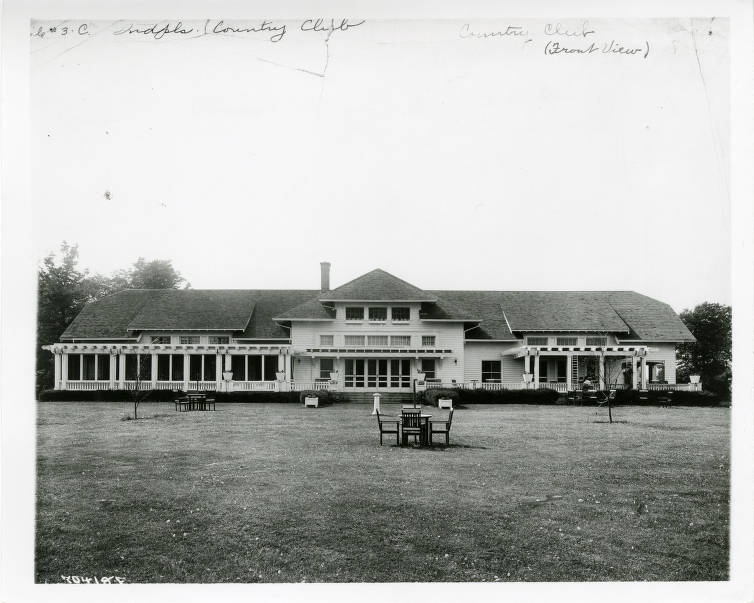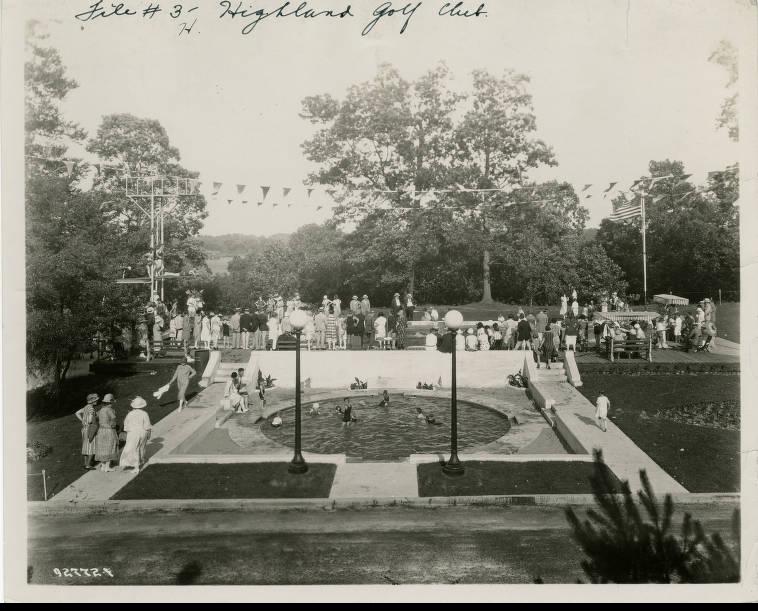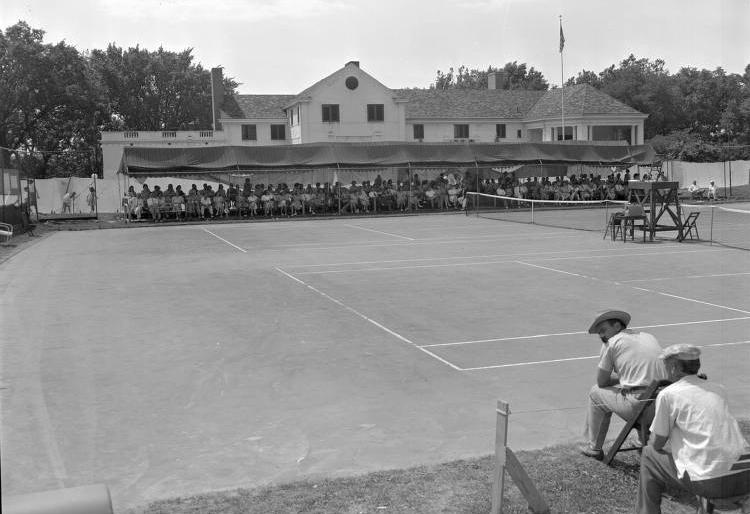By the late 1800s, country clubs were popular social centers for the cultural elite in many American communities, including Indianapolis. The city’s first country club, the Indianapolis Country Club, was incorporated on June 4, 1891, and, within a few decades, was joined by a half dozen others.

Early Country Clubs
The Indianapolis Country Club purchased land near the outskirts of the city, the current grounds of Woodstock Country Club, but soon needed a new location as Indianapolis grew. In 1912, the club purchased land on Crawfordsville Road for a golf course. Golfing had been a popular activity at American country clubs since the 1890s. When its clubhouse burned in 1914, one group of members, who later organized the Country Club of Indianapolis, decided to concentrate on and move to the new land. Early members included , , , and . Another group decided to remain and rebuild, establishing Woodstock.

Other early clubs included Highland Golf and Country Club (1908), Broadmoor (begun as a Jewish club, 1921), Hillcrest Country Club (formerly Avalon Hills Country Club, 1926, reorganized, 1933, as Hillcrest), Meridian Hills Country Club (1923), and Lake Shore Country Club (1936).
Country Clubs in Second Half of the 20th Century
In the 1950s, country clubs became connected with suburban real estate development, and many, such as Hawthorne Hills (1959), included club membership with the purchase of a lot. A related development was the family swimming and recreation club (no golf facilities). Several were established in the mid-1950s, including Westwood Country Club (1954), Devon Country Club (1958), Dolphin Club (1959), and many others no longer in operation. Among the earliest of the family clubs was the (1933), well-known for its swim teams. In 1967, the Sherwood Country Club was established for the teen crowd. Located on 34 acres, the club had 1,800 members by 1971 and sponsored dances and concerts at its clubhouse.
Although often associated with private golf facilities in later years, many clubs did not begin that way. Avalon Hills and Westchester initially were family swimming clubs, later adding golf courses. Woodland (1956), however, was originally established as a golf course and later incorporated as a private club.
Other notable area clubs that organized during the second half of the 20th century included Woodland Country Club (formerly Woodland Golf Club, 1956), Crooked Stick Golf Club (1964), Brookshire Golf Club (1979), and Twin Lakes Golf Club (1985) in , Ulen Country Club (1956) in , Royal Oak Country Club (1962) in , and Harbour Trees Golf Club (1972) in . As of the early 1990s, the Country Club of Indianapolis and Meridian Hills Country Club had the highest initiation fees ($20,000), while the Riviera Club had the largest number of members (4,500).
Several Indianapolis area country clubs include golf courses designed by renowned golf course architects and , including the Maple Creek Country Club, in Indianapolis; the Bridgewater Club, Crooked Stick Golf Club, Plum Creek Golf Course, a Woodland Country Club, Harbour Trees Golf Club, and the Club at Chatham Hills in Hamilton County; the Oak Tree Golf Course in Henderson County; and Dye’s Walk Country Club (named for Dye) in Greenwood.
Country Clubs in the 21st Century
The financial prosperity of country clubs plummeted over the course of the early 2000s, as a variety of other recreational options became available and the popularity of golf declined. Moreover, many corporations no longer funded expensive memberships for mid-level managers. Country clubs, therefore, experienced little growth in membership numbers.

The economic recession of 2008 led to six-figure losses at many Indianapolis country clubs, including Woodstock, Broadmoor, Hillcrest, and Highland. To offset these losses, club boards and managers were forced to change the way they operate. They worked to develop facilities and programs to attract new and younger members. Many clubs lowered initiation fees, implemented discounts, and relaxed dress codes.
For instance, by the end of the 2010s, while Meridian Hills’ golf initiation fee had increased to $40,000, its social membership fee had dropped to $3,500 in a bid to attract younger members. Woodstock Country Club not only dropped its requirements for coats and ties in its dining room but also treated the partners of all unmarried members, including same-sex partners, as full members, not guests.
These measures led to a financial rebound among many area clubs by the mid-2010s. However, as of 2020, with the coronavirus (COVID-19) pandemic, the future of many country clubs, especially those that were less well established, was again in question.
Country Clubs and Discrimination
As did country clubs across the U.S., Indianapolis clubs regularly discriminated against African Americans and Jews. Members of the established Broadmoor Country Club in 1921 because they were not allowed membership elsewhere. Westchester Country Club, organized in 1955, also began as a Jewish club.
The Riviera Club, founded as a white Protestant club, became the target for desegregation protests for African Americans and Jews as well by the 1950s. A noteworthy exception, the Sportsman’s Country Club, established in 1969 and backed by African American professional athletes and local businessmen, was an unsuccessful attempt at an integrated club. Due to financial difficulties, the club failed within a few years, reorganized as the Scenic View Country Club, and in 1973 sold its property to the Apostolic Christ Church congregation.
While policies excluding Jews waned in the 1960s, many country clubs remained segregated for most of the 20th century. In 1990, the Professional Golf Association (PGA) adopted the stance that it would not hold tournaments at courses that discriminated against Black individuals, which led many clubs across the U.S. to open up membership to African Americans and others. As a direct result of this policy, Crooked Stick Golf Club in Carmel recruited its first Black member in 1991 so that it could host the PGA Championship. In 1992, Highland Country Club followed and accepted Black membership, after a formal complaint to the Indiana Civil Rights Commission. Yet, even as late as 2010, accusations arose alleging racism at Highland.
Noteworthy Championships and Events
Local clubs have hosted many national and international tournaments including the Western Tennis Tourney (biennially, 1922-1968) and the Clay Court Championship (1970, 1973) at Woodstock, the Mayflower Classic (1981-1988) at the Indianapolis Country Club, and the PGA Champions Tour (1988-1993) at Broadmoor. The Dye-designed Crooked Stick Golf Club has held the PGA Championship (1991), U.S. Women’s Open (1993), the Solheim Cup (2005), the U.S. Senior Open (2009), and the BMW Championship (2012, 2016).

Help improve this entry
Contribute information, offer corrections, suggest images.
You can also recommend new entries related to this topic.